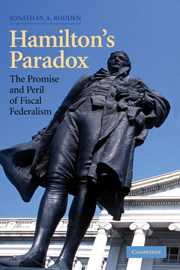Book contents
- Frontmatter
- Contents
- Preface
- Acknowledgments
- 1 INTRODUCTION AND OVERVIEW
- 2 PROMISE AND PERIL: INTELLECTUAL HISTORY
- 3 SOVEREIGNTY AND COMMITMENT
- 4 THE POWER OF THE PURSE: INTERGOVERNMENTAL GRANTS AND FISCAL DISCIPLINE
- 5 DISEASE OR CURE? POLITICAL PARTIES AND FISCAL DISCIPLINE
- 6 AN APPROACH TO COMPARATIVE CASE STUDIES
- 7 FISCAL FEDERALISM AND BAILOUTS IN POSTWAR GERMANY
- 8 THE CRISIS OF FISCAL FEDERALISM IN BRAZIL
- 9 THE CHALLENGE OF REFORM IN FEDERATIONS
- 10 THE ORIGINS OF SUBNATIONAL SOVEREIGNTY
- 11 CONCLUSIONS
- References
- Index
- Titles in the series
11 - CONCLUSIONS
Published online by Cambridge University Press: 14 January 2010
- Frontmatter
- Contents
- Preface
- Acknowledgments
- 1 INTRODUCTION AND OVERVIEW
- 2 PROMISE AND PERIL: INTELLECTUAL HISTORY
- 3 SOVEREIGNTY AND COMMITMENT
- 4 THE POWER OF THE PURSE: INTERGOVERNMENTAL GRANTS AND FISCAL DISCIPLINE
- 5 DISEASE OR CURE? POLITICAL PARTIES AND FISCAL DISCIPLINE
- 6 AN APPROACH TO COMPARATIVE CASE STUDIES
- 7 FISCAL FEDERALISM AND BAILOUTS IN POSTWAR GERMANY
- 8 THE CRISIS OF FISCAL FEDERALISM IN BRAZIL
- 9 THE CHALLENGE OF REFORM IN FEDERATIONS
- 10 THE ORIGINS OF SUBNATIONAL SOVEREIGNTY
- 11 CONCLUSIONS
- References
- Index
- Titles in the series
Summary
This final chapter draws together the key conclusions of the book, places them in a larger context, and assesses policy implications. It starts by revisiting the basic paradox that motivates the book: two seemingly irreconcilable views of federalism. It then summarizes the arguments and evidence that have been mobilized to show that vastly different incentive structures from one country to another – and from one province to another – can help sort out some of the promise and especially the perils of fiscal federalism in recent decades. These findings allow for some fairly solid conclusions about conditions under which the perils of fiscal federalism are greatest, and these translate into some useful contemporary policy implications – especially for newly decentralizing countries. Finally, this chapter concludes with a discussion of future research that might address some questions that have been raised but not answered in this book.
Hamilton's Paradox Revisited
This book started with the paradox of Alexander Hamilton's writings and actions in the realm of fiscal federalism. He believed that federalism – if it implies divided sovereignty – inevitably leads to inefficiency at best and at worst “renders the empire a nerveless body” (Federalist 19). Yet as part of his centralization strategy, he was forced to throw some bones to his opponents from Virginia. He joined in writing some essays that, while pointing out its perils, defended the principle of divided sovereignty more eloquently than any treatise before or since.
- Type
- Chapter
- Information
- Hamilton's ParadoxThe Promise and Peril of Fiscal Federalism, pp. 269 - 282Publisher: Cambridge University PressPrint publication year: 2005

